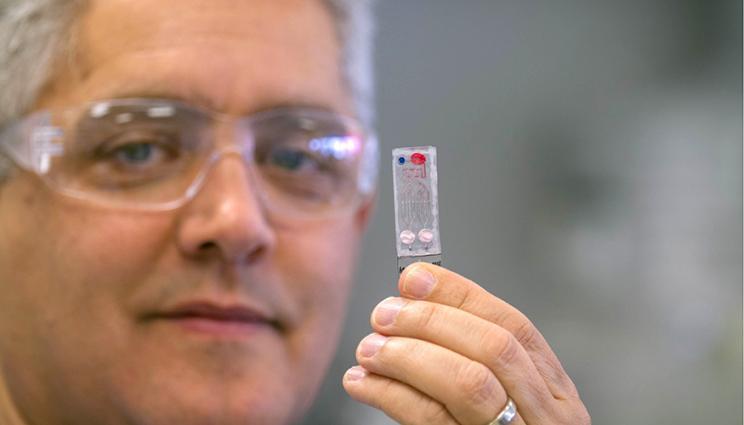Proper medical treatment has always been contingent on first accurately determining what is afflicting the patient. Often, if the reason for illness cannot be properly identified, attempted treatment may not benefit the patient, and, sometimes, may even cause the patient's condition to worsen. The necessity for proper medical diagnosis is apparent in contemporary healthcare but is particularly significant where access to interactive healthcare is not available, such as on exploratory missions to other planets. Personnel on deep space missions may encounter conditions or situations which may lead to known or even unpredictable illnesses and injuries. Thus, utilizing an adaptive device to aid in the medical diagnosis of known and, potentially, novel illnesses would be a great asset in that or similar situations.
LLNL researchers have developed a portable device which analyzes one or multiple types of body fluids or gases to test for one or more medical conditions. A bodily fluid (such as blood, perspiration, saliva, breath, or urine) is put into a condenser surface and is then separated into both a primarily gas fluid component and a second one that is primarily liquid. These two samples from the same fluid or gas source are subjected to analysis by, in various combinations, five different instruments: a condenser, functionalized nanostructures, an optional volatilizer, a differential mobility spectrometer, and an optional biomarker analyzer. Each instrument provides a unique analysis of a physical or chemical element of the tested bodily fluid.
LLNL's device provides a single-sample multi-faceted medium for portable medical diagnosis which could play a significant role in ensuring accurate diagnosis of humans in remote or austere environments, or environments where access to interactive healthcare is not available. Furthermore, this portable medical diagnosis instrument is equipped to process a diverse range of bodily fluids and gases, allowing it to assess the presence of a wide variety of illnesses.
- Accurate medical diagnosis in remote or austere environments for autonomous care away from interactive healthcare
- Diagnosis of a condition from a bodily fluid or gas sample or both
- Programming of the portable medical diagnosis instrument to identify novel illnesses after discovery
LLNL, Sandia National Laboratories, UC Davis and NASA have been granted a US Patent 9,824,870 "Portable medical diagnosis instrument" (LLNL internal case # IL-13001)



